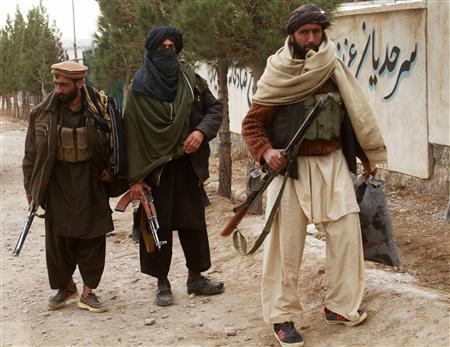
Qatar will support President Hamid Karzai’s condition for opening a Taliban office in the oil-rich Gulf state, according to Afghan officials privy to Karzai’s discussions with senior jihadist and political leaders in Kabul.
Under the Afghan leader’s demands, the Taliban office will only be used for talks with the government-backed Afghan High Peace Council. It is to be strictly barred from any other political activities.
“The Emir of Qatar agreed with President Karzai’s proposal, giving him strong assurances,” said an Afghan leader requesting anonymity. “We consider the Qatari ruler’s support a major step forward in this hard-to-achieve peace process.”
The Afghan government has now sought written guarantees from Qatar and the United States to accept Karzai’s conditions, added the official. “The office will be closed if the Taliban violate the conditions”.
According to a statement issued by his office on Wednesday, Karzai, on his return from Qatar, convened a special meeting with senior jihadist and political leaders to inform them about “recent developments in the Afghan-led peace process”.
However, according to Taliban leaders, several of whom are now permanently living in Qatar with their families, the office in the gulf has a far more grand purpose.
“With the inauguration of our office in Qatar, representatives of other countries can easily contact us and vice versa,” said Maulvi Mohammad Saleem, deputy head of the Taliban Cultural Commission. “Similarly, our representatives can express and explain the objectives and demands of the Islamic Emirate to others.”
While talking to Morchal, a Taliban magazine, Saleem said Taliban representatives in Qatar had visited different countries and informed the global community about the group’s stance “very openly”.
The Taliban office had once been a source of tension between Qatar and Afghanistan, as Karzai’s administration preferred Turkey or Saudi Arabia as a mediator. Karzai had even recalled his ambassador to Qatar in December 2011 after news reports suggested the United States had been mediating talks in Doha and the emirate planned to host a Taliban peace mission.
The Afghan president feared his government would be excluded in any future peace deals. Meanwhile, the Taliban refused to have direct contact with Karzai and said the United States was the main party to the conflict.
Karzai later softened his stance and Doha agreed the Taliban office would strictly be used for peace talks in the Afghan-led peace process. Moreover, Karzai had, in fact, agreed to a Taliban office in Qatar during a visit to the US in January when he spoke to President Barack Obama.
Later, speaking at a joint press conference in Kabul with US Secretary of State John Kerry in March, Karzai announced the Qatar office would be in the national interest.
Karzai then visited Qatar to attend the US-Islamic World Forum. However, his focus was on seeking the Gulf state’s support in establishing contact with Taliban negotiators. Chief of the Afghan High Peace Council, Salauddin Rabbani, who accompanied Karzai to Qatar, told Tolo Television in Kabul just days before the Qatar visit that direct talks with the Taliban would soon be held.
Additionally, a senior Afghan official told The Express Tribune the US Special Envoy for Afghanistan and Pakistan, James Dobbins, had conveyed to Karzai that Taliban figures in Qatar were “willing to talk”.
The Taliban, however, came with conditions stating they would not publicly denounce al-Qaeda or acknowledge the Afghan High Peace Council. According to an official, they were willing to condemn acts of terrorism without naming al-Qaeda and say they were talking to Afghanistan without mentioning the peace council.
In turn, the Afghan government disagreed with the Taliban’s conditions hoping the Taliban would also soften their stand. Taliban spokesperson, Qari Muhammad Yousaf, meanwhile denied the group’s willingness to talk to Karzai’s government.
But some Afghan officials in Kabul along with senior Pakistani religious leaders, who have contacts with the Afghan Taliban, believe the US has revived contact with Qatar-based Taliban representatives which could pave the way for progress in the peace process.
The Taliban leaders’ visit to Iran this month would not be possible without permission from Qatar officials and the US. Additionally, some Nato countries wanted Tehran involved in the peace process. A section of the Afghan media reported Afghan officials were ‘surprised’ at the US ‘relaxation’ towards Qatar-based Taliban. Despite this, these developments indicate some positive movement in the peace front in the near future.
Published in The Express Tribune, June 15th, 2013.











COMMENTS
Comments are moderated and generally will be posted if they are on-topic and not abusive.
For more information, please see our Comments FAQ